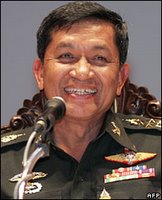
Thai military rulers said Tues September, 26 they had completed a draft interim constitution and planned to name a new prime minister as soon as possible.
The military leaders that ousted Prime Minister Thaksin Shinawatra announced that they would have a say in the creation of a new permanent constitution, reserving a political role for themselves despite a vow to hand over power to an interim civilian government.
Coup leader Gen. Sonthi Boonyaratglin said that the ruling military council was narrowing down its candidates for a civilian prime minister to replace them but had not yet made a final decision.
He did not rule out appointing an ex-military official as the incoming prime minister. "When you say 'civilian prime minister,' you will see that soldiers after they retire can be called civilians," Sonthi said in a response to a question during a nationally televised press conference.
Sonthi also said he did not expect Thaksin to return home anytime soon. "I think he is aware of the situation," "I do not think he will return in the near future."Sonthi said.
Since taking power, the military council has established several anti-corruption panels to investigate alleged wrongdoing by the Thaksin government.
The military has cited corruption in the former Thaksin government as one of the reasons for its September 19 coup, staged while Thaksin was in New York for the annual U.N. General Assembly meeting.
The top graft fighting panel said Monday it might freeze the assets of Thaksin and his top aides if evidence was found they tried to transfer their wealth abroad. Thaksin is currently in London.
The former prime minister's family was one of the wealthiest in Southeast Asia even before he came into office in 2001.
Sawat Chotiphanit, the newly appointed head of a special investigatory committee, said Thaksin's assets and those of his former Cabinet members would be frozen if it appeared they tried to transfer their assets abroad.
"If we find evidence that they tried to transfer their assets overseas we will freeze the assets," said Sawat, whose nine-member committee was formed Sunday night.
Its members include the heads of the nation's main financial institutions, including the stock exchange and the central bank, and it has extraordinary powers to confiscate assets. It will focus on several government mega-projects that may have been tainted by corrupt dealings.
No comments:
Post a Comment